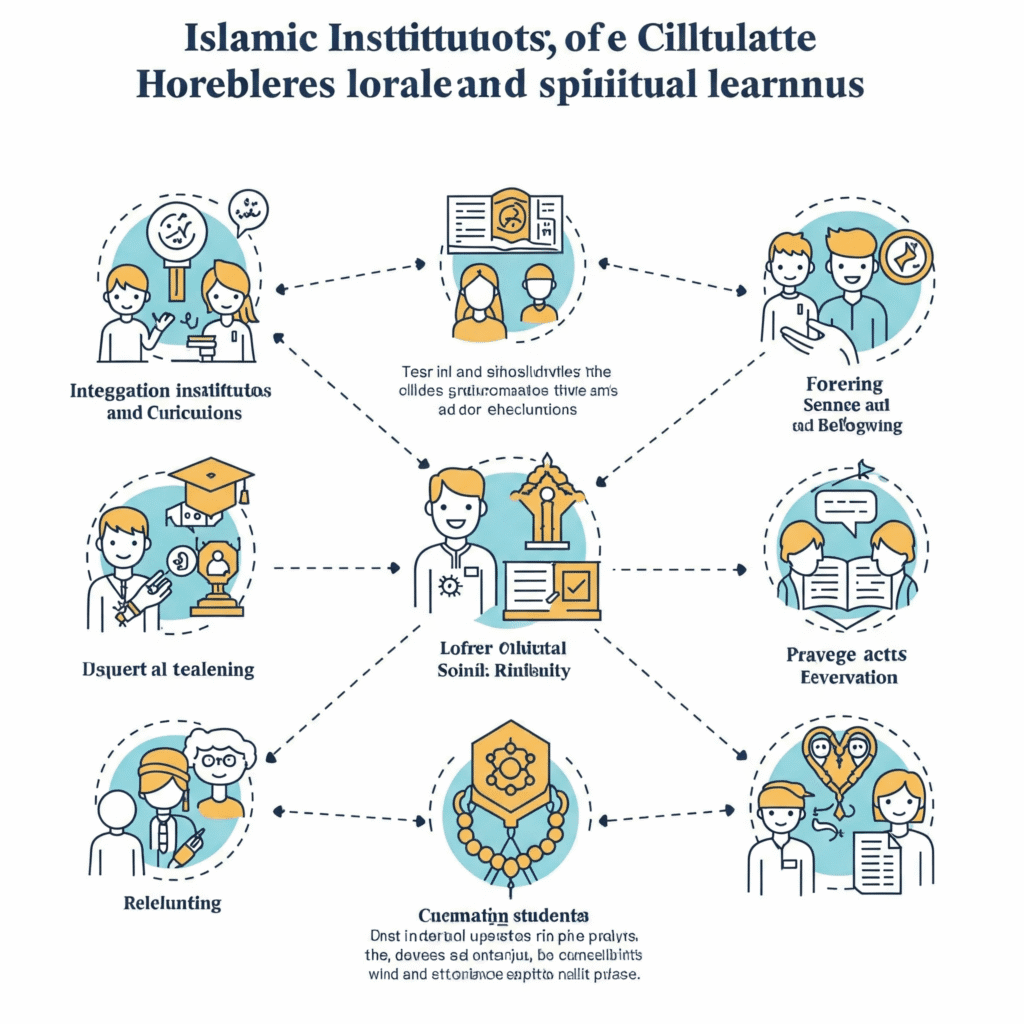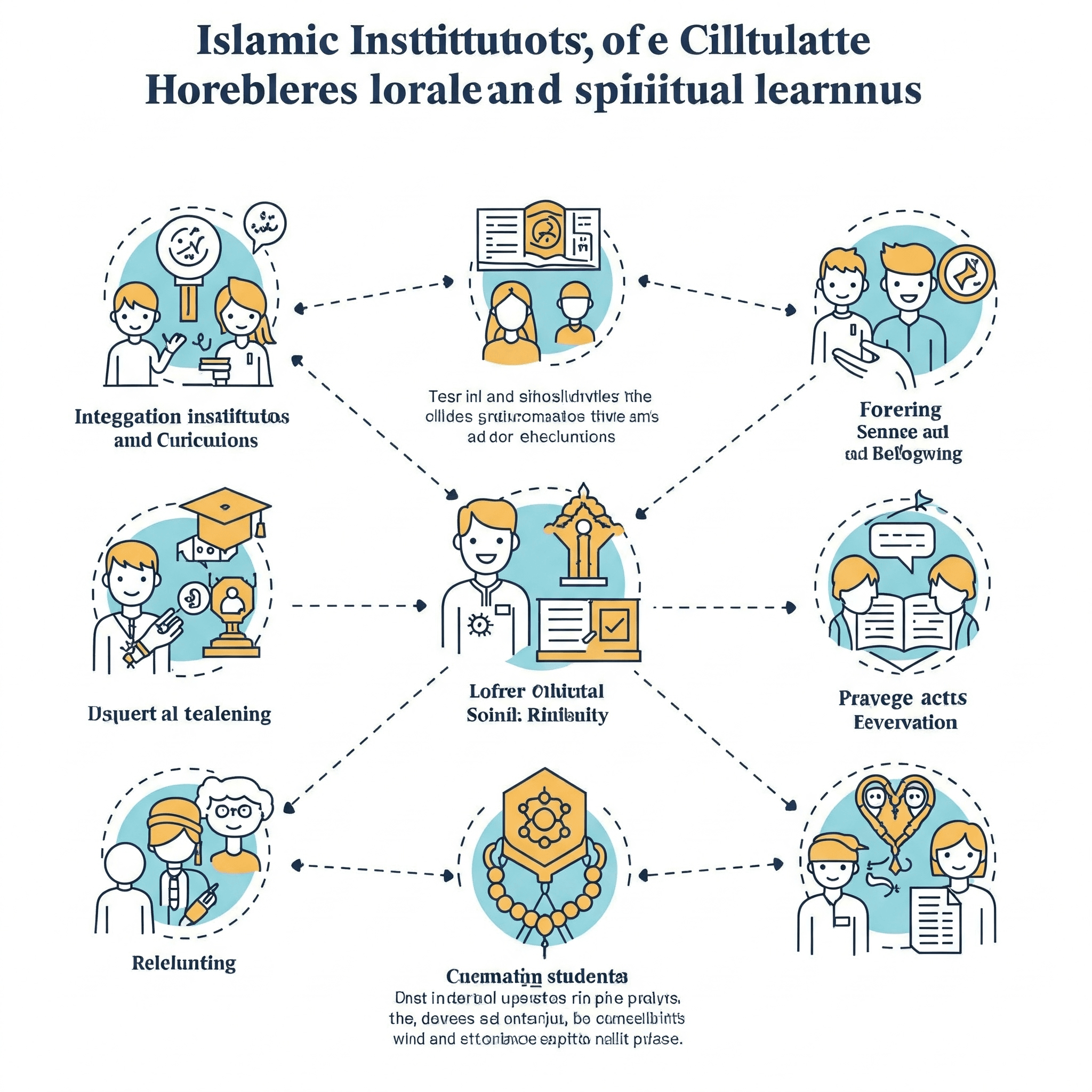Islamic universities occupy a unique space in the global educational landscape, harmonizing intellectual pursuit with spiritual and moral cultivation. Rooted in the teachings of the Qur’an and Sunnah, these institutions aim to produce individuals who embody the prophetic ideal of being “a mercy to mankind” (Qur’an 21:107). By integrating Islamic principles with modern disciplines, Islamic universities foster holistic development, nurturing not only the mind but also the soul and character. Drawing on classical Islamic texts such as the Qur’an, Hadith, and works by scholars like Imam Al-Ghazali and Ibn Qayyim al-Jawziyya, this article explores in depth how Islamic universities promote spiritual and moral development through their curricula, spiritual practices, ethical frameworks, community engagement, intellectual traditions, and global outreach.

1. A Curriculum Rooted in Islamic Epistemology
The cornerstone of spiritual and moral development in Islamic universities is a curriculum grounded in Islamic epistemology, which views knowledge as a sacred trust from Allah. The Qur’an emphasizes the pursuit of knowledge as a means to draw closer to the Divine: “And say: My Lord, increase me in knowledge” (Qur’an 20:114). Islamic universities operationalize this directive by requiring students to study core Islamic sciences, including Tafsir (Qur’anic exegesis), Hadith, Fiqh (Islamic jurisprudence), Aqidah (theology), and Sirah (Prophetic biography), alongside secular disciplines.
For instance, Al-Azhar University in Cairo mandates courses on Qur’anic sciences for students in fields as diverse as engineering, medicine, and literature. These courses draw heavily on classical texts like Imam Al-Tabari’s Jami’ al-Bayan for Tafsir and Sahih al-Bukhari for Hadith, ensuring students engage directly with primary sources. Such studies instill values like justice, compassion, and accountability, as exemplified in the Hadith: “The best of you are those who are best in character” (Sahih Muslim, 2321).
Moreover, Islamic universities adopt an interdisciplinary approach, applying Islamic ethics to modern fields. In business programs, students explore Islamic finance principles derived from texts like Ibn Qayyim’s I’lam al-Muwaqqi’in, which prohibits usury (riba) and emphasizes ethical transactions. Similarly, medical ethics courses draw on Al-Ghazali’s Ihya Ulum al-Din, which underscores the sanctity of life and the physician’s moral responsibility. By embedding Islamic principles across disciplines, these institutions ensure that knowledge serves as a tool for spiritual elevation and moral rectitude.
2. Nurturing Spiritual Practices as a Way of Life
Spiritual development in Islamic universities is deeply tied to the cultivation of religious practices, which are seen as pathways to Taqwa (God-consciousness). The Qur’an describes Taqwa as the ultimate goal of human endeavor: “O mankind, worship your Lord… that you may attain righteousness” (Qur’an 2:21). Universities like the Islamic University of Madinah and Universitas Islam Indonesia facilitate this through structured spiritual programs and campus infrastructure.
On-campus mosques serve as spiritual hubs, hosting the five daily Salah, Jumu’ah (Friday) prayers, and Taraweeh during Ramadan. These spaces are designed to foster communal worship, which the Prophet Muhammad (peace be upon him) emphasized: “The prayer in congregation is twenty-seven times superior to the prayer offered by a person alone” (Sahih al-Bukhari, 645). Beyond obligatory prayers, universities organize Halaqah (study circles) for Qur’an memorization and Tajwid (proper recitation), drawing on the Prophetic encouragement: “The one who recites the Qur’an beautifully, smoothly, and precisely, he will be in the company of the noble and obedient angels” (Sahih al-Bukhari, 4937).
Voluntary acts of worship, such as fasting outside Ramadan and Dhikr (remembrance of Allah), are also promoted. For example, the International Islamic University Malaysia (IIUM) hosts weekly Dhikr sessions based on Al-Ghazali’s teachings in Ihya Ulum al-Din, which describe Dhikr as “the polish of the heart.” These practices cultivate self-discipline, humility, and empathy, aligning with Ibn Qayyim’s assertion in Madarij al-Salikin that spiritual acts purify the soul and fortify moral resolve.
3. Embedding Akhlaq (Moral Character) in Education
Moral development is a central pillar of Islamic education, rooted in the concept of Akhlaq, or exemplary character. The Prophet Muhammad (peace be upon him) declared, “I was sent to perfect noble character” (Muwatta Malik, 47.1.8), a statement that underscores the primacy of ethics in Islam. Islamic universities operationalize this through curricula, faculty mentorship, and institutional policies.
Courses on Akhlaq draw on classical texts like Al-Ghazali’s Ihya Ulum al-Din, which outlines virtues such as honesty, patience, and forgiveness, and vices to avoid, such as arrogance and envy. At Qatar’s Hamad Bin Khalifa University, professors integrate ethical discussions into their teaching, using case studies to explore dilemmas through an Islamic lens. For instance, engineering students might debate the ethical implications of AI surveillance, referencing the Qur’anic injunction to uphold justice: “O you who have believed, be persistently standing firm in justice, witnesses for Allah” (Qur’an 4:135).
Faculty members serve as role models, embodying the Prophetic qualities of Sidq (truthfulness) and Amanah (trustworthiness). At Al-Qarawiyyin University in Morocco, professors are trained to mentor students not only academically but also spiritually, following Al-Ghazali’s advice that a teacher’s character shapes the student’s soul. Institutional codes of conduct further reinforce moral behavior, emphasizing modesty, respect, and academic integrity. Violations are addressed through restorative practices, reflecting the Islamic principle of Tarbiyah (nurturing growth), as outlined in Ibn Qayyim’s Tuhfat al-Mawdud.
4. Community Engagement as an Act of Worship
Islamic universities view community engagement as an extension of spiritual and moral development, inspired by the Qur’anic call to enjoin good and forbid evil: “You are the best nation produced for mankind. You enjoin what is right and forbid what is wrong” (Qur’an 3:110). The concept of Sadaqah (charity) and serving humanity as an act of Ibadah (worship) drives students to participate in social justice initiatives.
For example, the International Islamic University in Islamabad organizes outreach programs addressing poverty, literacy, and environmental sustainability. These initiatives draw on the Hadith: “The best of people are those who bring the most benefit to others” (Al-Tabarani, Mu’jam al-Kabir). Students volunteer in orphanages, distribute food to the needy, and plant trees, embodying the Prophetic example of compassion.
Globally, universities like Turkey’s Istanbul Sabahattin Zaim University partner with NGOs to support refugee education and disaster relief, reflecting the Islamic principle of Rahmah (mercy). Such activities teach students to internalize empathy and social responsibility, aligning with Al-Ghazali’s teaching in Ihya Ulum al-Din that true piety manifests in service to others. By linking community engagement to spiritual growth, Islamic universities ensure that moral development extends beyond the individual to society at large.
5. Balancing Critical Thinking with Islamic Principles
Islamic universities encourage intellectual inquiry within the framework of Islamic principles, fostering critical thinking that is both rigorous and reverent. The Qur’an repeatedly urges reflection: “Do they not reflect upon the Qur’an, or are there locks upon their hearts?” (Qur’an 47:24). This balance is evident in institutions like the University of Sharjah, where students engage with contemporary issues—such as bioethics, artificial intelligence, and climate change—through an Islamic ethical lens.
Programs in Islamic sciences draw on the classical tradition of Ijtihad (independent reasoning), as practiced by scholars like Imam Malik and Imam Shafi’i. Students are taught to analyze modern challenges using methodologies from texts like Al-Shatibi’s Al-Muwafaqat, which emphasizes Maqasid al-Shari’ah (the objectives of Islamic law), such as preserving life, intellect, and justice. For example, law students at IIUM might debate the ethics of genetic engineering, referencing Qur’anic verses on the sanctity of creation (Qur’an 32:7) alongside scientific research.
Seminars and workshops further promote intellectual humility, a virtue extolled by Ibn Qayyim in Madarij al-Salikin, which warns against arrogance in knowledge. By fostering critical thinking within Islamic boundaries, universities produce graduates who are innovative yet morally grounded, capable of addressing global challenges without compromising their faith.
6. Building a Cohesive and Inclusive Community
The sense of Ummah (community) is a vital component of spiritual and moral development in Islamic universities. The Qur’an describes believers as a single brotherhood: “The believers are but brothers” (Qur’an 49:10). Institutions like Al-Qarawiyyin University and Malaysia’s Universiti Sains Islam Malaysia (USIM) cultivate inclusive environments where students from diverse backgrounds unite through shared faith and values.
Student organizations, such as Islamic societies and charity clubs, organize events like interfaith dialogues, cultural festivals, and collective Iftar during Ramadan. These activities reinforce the Prophetic teaching: “The example of the believers in their affection, mercy, and compassion for each other is that of a body” (Sahih al-Bukhari, 6011). Mentorship programs pair students with faculty or senior peers, providing guidance on spiritual and ethical challenges, as recommended in Al-Ghazali’s Bidayat al-Hidayah.
This supportive community fosters emotional resilience and moral accountability, helping students internalize values like Adl (justice) and Ihsan (excellence). By creating a microcosm of the Ummah, Islamic universities nurture individuals who are spiritually connected and morally responsible.
7. Addressing Global Challenges with Islamic Ethics
In a globalized world, Islamic universities are adapting to modern challenges while remaining anchored in their spiritual and moral mission. The Islamic concept of Khilafah (stewardship) over the Earth, as articulated in the Qur’an (2:30), inspires institutions to address issues like climate change, social inequality, and technological ethics.
For example, the Islamic Online University (now the International Open University) offers accessible programs that emphasize spiritual growth alongside practical solutions for global problems. Courses on sustainable development draw on Qur’anic injunctions to avoid wastefulness (Qur’an 7:31) and Hadith encouraging environmental care, such as “If a Muslim plants a tree… it is a charity for him” (Sahih Muslim, 1552).
International exchange programs, like those at Turkey’s Marmara University, expose students to global perspectives while reinforcing Islamic values. By equipping students to tackle modern challenges with ethical clarity, Islamic universities fulfill the Prophetic mission of being “a light for humanity” (Qur’an 33:46).
8. The Role of Tazkiyah (Purification of the Soul)
At the heart of Islamic universities’ mission is Tazkiyah, the purification of the soul, which integrates spiritual and moral development. The Qur’an links Tazkiyah to success: “He has succeeded who purifies it [the soul]” (Qur’an 91:9). Drawing on Al-Ghazali’s Ihya Ulum al-Din and Ibn Qayyim’s Madarij al-Salikin, universities emphasize practices that cleanse the heart of vices like greed and pride while cultivating virtues like sincerity and gratitude.
Spiritual retreats, known as I’tikaf, are organized during Ramadan, allowing students to focus on worship and self-reflection. Lectures on Tazkiyah, often based on Al-Muhasibi’s Risalat al-Mustarshidin, teach students to combat Nafs (base desires) through mindfulness and repentance. By prioritizing Tazkiyah, Islamic universities ensure that spiritual growth underpins moral behavior, producing graduates who embody Ihsan, or excellence in faith and conduct.
Conclusion
Islamic universities serve as beacons of holistic education, seamlessly blending intellectual, spiritual, and moral development. By rooting their curricula in Islamic epistemology, nurturing spiritual practices, embedding Akhlaq, fostering community engagement, balancing critical thinking with faith, building inclusive communities, addressing global challenges, and prioritizing Tazkiyah, these institutions produce individuals who are not only scholars but also servants of Allah and humanity. Drawing on the Qur’an, Hadith, and classical works by scholars like Al-Ghazali and Ibn Qayyim, Islamic universities embody the Prophetic mission of perfecting character and spreading mercy. In an era of moral and spiritual challenges, their role in cultivating principled, compassionate, and purpose-driven individuals is more vital than ever, fulfilling the Islamic vision of education as a path to both worldly success and eternal salvation.
Must read:
- Conquer the Post-Ramadan Blues: Unleash Vibrant Spirituality to Sustain Momentum After Eid!
- Discover the Inspiring Truth: Islam’s Tolerance Fosters Vibrant Coexistence!
- Unlock the Vibrant Secret: Ramadan’s Nourishing Suhoor & Iftar Ideas to Supercharge Your Health!
FAQs
What is the primary goal of Islamic universities in promoting spiritual and moral development?
Islamic universities aim to produce well-rounded individuals who combine intellectual excellence with spiritual depth and moral integrity, as guided by the Qur’anic verse: “And say: My Lord, increase me in knowledge” (Qur’an 20:114). They seek to nurture Taqwa (God-consciousness) and Akhlaq (noble character), aligning with the Prophet Muhammad’s mission: “I was sent to perfect noble character” (Muwatta Malik, 47.1.8).
How do Islamic universities integrate spiritual development into their curricula?
They incorporate mandatory courses on Islamic sciences, such as Tafsir, Hadith, Fiqh, and Aqidah, alongside secular disciplines. For example, Al-Azhar University requires engineering students to study Qur’anic exegesis, drawing on texts like Imam Al-Tabari’s u003cemu003eJami’ al-Bayanu003c/emu003e. These courses emphasize values like justice and compassion, ensuring spiritual principles inform all learning.
What role do spiritual practices play in campus life at Islamic universities?
Spiritual practices, such as Salah, Qur’an recitation, and Dhikr, are central to campus life. Universities like the Islamic University of Madinah provide mosques and host Halaqah (study circles) for Qur’an memorization, inspired by the Hadith: “The one who recites the Qur’an beautifully… will be in the company of the noble angels” (Sahih al-Bukhari, 4937). These practices foster self-discipline and God-consciousness.
How do Islamic universities ensure moral development among students?
Moral development is embedded through courses on Akhlaq, faculty mentorship, and ethical codes of conduct. Drawing on Al-Ghazali’s u003cemu003eIhya Ulum al-Dinu003c/emu003e, universities teach virtues like honesty and humility. Faculty model Prophetic qualities like Sidq (truthfulness), and restorative practices address misconduct, reflecting the Islamic emphasis on Tarbiyah (nurturing growth).
Are non-Islamic students required to participate in spiritual or moral programs?
While Islamic studies and practices are integral, non-Muslim students are generally not obligated to participate in religious activities. Universities like the International Islamic University Malaysia (IIUM) encourage inclusivity, allowing non-Muslims to engage in ethical discussions or community service, aligning with the Qur’anic call for mutual respect: “To you is your religion, and to me is my religion” (Qur’an 109:6).
How do Islamic universities promote community engagement?
They emphasize service as an act of worship, inspired by the Qur’an: “You are the best nation produced for mankind. You enjoin what is right” (Qur’an 3:110). Institutions like the International Islamic University in Islamabad organize outreach programs, such as poverty alleviation and environmental initiatives, teaching students to embody the Hadith: “The best of people are those who bring the most benefit to others” (Al-Tabarani, Mu’jam al-Kabir).


Post Comment